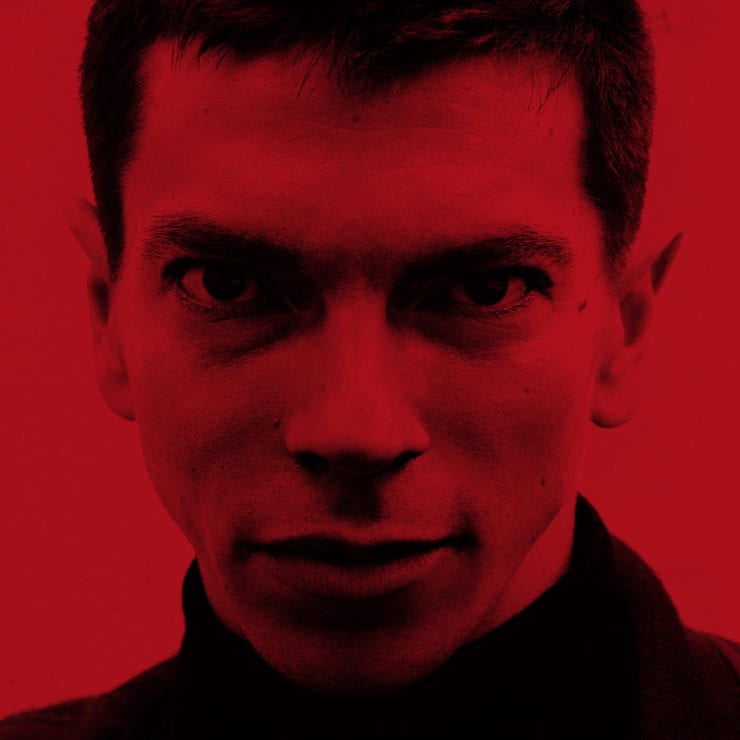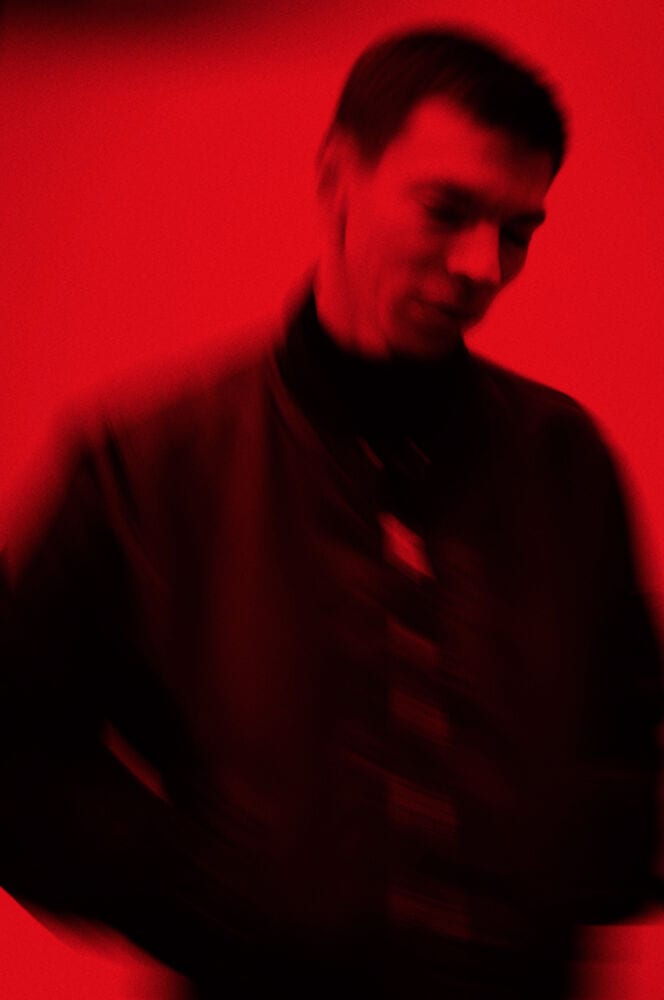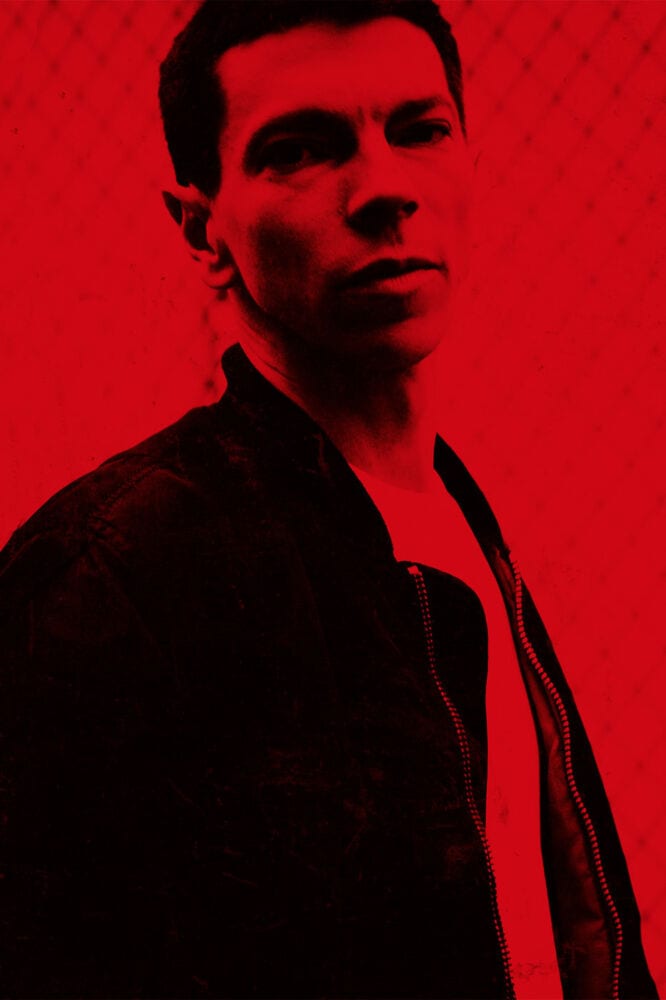
His youthful air and winning smile may trigger off misleading impressions as to what Maelstrom is all about, whilst concealing the man’s remarkable longevity in a game way too often centred around artificially-inflated, easily squashable hypes.
Schooled to the sound of Detroit techno, Rephlex and Warp back in the ’90s prime, Joan-Mael Péneau has evolved in symbiosis with the elusive spirit of rave music, from his early love for trance-inducing alien sounds, through formative debuts in the wilder realms of hardtek and free-parties, onto a true artistic resurrection under his present alias – crowned by a flock of outstanding releases for the likes of CPU, Cultivated Electronics, Private Persons, his own label, RAAR, and many more.
Stepping up in our mix series today, Maelstrom drops the hammer down badman style, gracing us with a helluva hour-long sonic trip. Spanning from old-school classics (Dopplereffekt, The Hacker…) to present-time sweat-inducers (Norwell, Morphology, Hermeth…), it’s an angry tsunami of paced up electro madness, untamed acid and wild machine funk that’s heading over. Prepare for impact.
Interview by Baptiste Girou

"When the scene started dying in the early 2000's (almost literally), drowning in drugs, pastiche and conformism, I realised I needed to get out and escape, because many people around me were either smoking crack or in prison and that wasn't the future I wanted for myself. The only choice I had was to reconnect with the music. It was all I had left, as the utopia had turned into a nightmare - as they generally do"
Having been around for well over two decades, it’s safe to say you’re in a position of authority to comment on the evolution of “raving”. Don’t you sometimes feel that ‘rave’ has become some sort of generic, catch-all term for parties that are in reality not ravey at all?
Thanks for that sick mix, please tell us more about it, when and how was it recorded?
Thanks! It was recorded in an ephemeral studio I had set up in Giens (South-East of France) in August to work on some new tracks. I didn’t have CDJs available there so I used Ableton Live, which gave me lots of options I couldn’t have used within a more traditional setup.
Building a mix this way is somehow closer to working on a track, just on a different scale – I really love how you can refine a transition, use the intro of a track to make it an outro or extend a part that works well by adding only a sample of something else on top of it.
What feeling did you want to convey through the mix?
I wanted to go back and dig in my playlists for stuff that got released from different decades and make them converse with one another.
The DJ Emile is a late ’90s classic (although it was repressed recently on Eric Estornel’s Lone Romantic imprint), the Dopplereffekt one is from the same period, as is the Hacker’s ‘Body Electric‘ (also repressed recently on Steffi and Dexter’s label), and they all work in the context of very recent music from the likes of Norwell, Morphology or Hermeth.
I’ve also been digging older stuff from my back catalogue, such as this ‘Seele‘ track that got released in the early 2010’s on BNR that I had almost forgot about (as a way also to remind whoever’s interested that I’ve been producing electro for longer than most people think (laughs).
I wanted to use the opportunity to think about how we’ve reached a stage where timelines are becoming irrelevant, nothing is chronological anymore, and the idea of progress has left center stage. It’s interesting to me because most techno and electro narratives still come from early Science Fiction novels and films, at a time when Science Fiction itself has become an artefact from the past.
This music is based on an idea of the future that is situated three or four decades back in the past, and when you place all these different tracks side by side, and think about the influences behind them, there are so many layers of references.
Let’s trace back to the roots of it all, how was your love for electronic music born?
It all started with ‘Black Market’, a small record shop in Nantes. I used to go there after school and spend hours digging through vinyl. Mostly it was music from the UK: EPs on Mo’Wax, Warp, that kind of thing.
What I wanted to know was how these records were made, and I remember lying on my bed smoking weed and being blown away by these sounds: they sounded so alien but at the same time so human, conveying emotions I could relate to.
That’s how it started for me: trying to figure out where these sounds were coming from… I’d say it took me 20 years to get an answer!
Before taking the bend towards the realm of breaksy acid and Detroit electro you started off your career producing gritty hardtek music primed for the wildest free parties. What prompted you to operate this aesthetic shift?
Well as I said, I had always been listening to IDM and electro, and I actually started buying Rephlex or Metroplex records way before I started buying hard-techno records, so that’s kind of my rosebud.
Around 1995/1996, a whole movement was born out of London’s squats and its rave scene started blossoming in France, with people like Spiral Tribe throwing illegal raves all over the country. When you’re 16 and you experience that kind of freedom first-hand, it changes everything, and that’s when I started making hardcore and hard-techno records.
Looking back, I’d say I was making music for political reasons, it was music made by teenagers who wanted to piss off the neighbours and the establishment. At least for me, it wasn’t so much about music but “making some fucking noise”.
At the time, I think I wasn’t ready to connect to the emotional, and maybe more personal aspect of music-making. Music was made to shock, to be played as loud as possible and scare the “bourgeois”. That’s what it was about really. If it was fast and hard then the goal was reached, no need to look further.
When the scene started dying in the early 2000’s (almost literally), drowning in drugs, pastiche and conformism, I realised I needed to get out and escape, because many people around me were either smoking crack or in prison and that wasn’t the future I wanted for myself. The only choice I had was to reconnect with the music. It was all I had left, as the utopia had turned into a nightmare – as they generally do.
It took me a long time, but around 2010/11 I think I found my voice and reconnected to the type of musical emotions that had moved me initially. The shift from hardcore to Detroit electro didn’t happen overnight, it took a while!
Do you recall a particular record or a gig that changed your life forever?
An illegal techno festival in ’97 by the river, maybe 20km from Nantes, organised as a protest against a Nuclear Power Plant project. More than 20 sound systems, with trucks, buses, trailers, home made speakers everywhere, and music I had never imagined could even exist. It was a physical experience as much as a political one.
Then record-wise, Autechre ‘Incunabula‘. This record changed my life. It showed me that you could convey something deeply personal using sine-waves and filter sweeps.

"Looking back, I'd say I was making music for political reasons, it was music made by teenagers who wanted to piss off the neighbours and the establishment. At least for me, it wasn't so much about music but making some fucking noise"
I’m not nostalgic of the early days at all – things were tough, the Police response was brutal, there was no sense of security for ravers (especially for women) or for artists, and it was quite often very bleak. The political aspect of raving has quite completely been discarded though, I guess it happens with all sub-cultures.
Now it’s a very safe environment (in most places), but it has lost some of the edge that made me want to get involved in promoting raves and making techno in the first place. I’m not sure it’s a good or a bad thing, but it’s true that there’s almost nothing in common between today’s “raves” and the ’90s experience.
The DJ was unknown, and hidden behind the speakers. The main stage was the crowd and the soundsystem, that’s why you traveled all night to a rave, because of the “20kw TurboSound”. Not because this or that DJ was playing. It was a social and a physical experience.
Today, music is back at the center of it all, which is amazing. I love how younger people come to talk to me at a gig and I realise they know almost all the tunes I played and understand very precisely what it is that I’m trying to do. Music itself is much more important today than it was 20 years ago.
You and your fellow partner-in-crime Louisahhh set up your own label, RAAR, back in 2015. Tell us more about the label’s aims and aspirations.
The idea behind RAAR is to create a space where artists feel like they can give up any fantasy about how they are in control of anything. We want to make them feel like nothing is forbidden.
It might seem like the scene is rooted in freedom but it’s not always that easy or simple to take risks, so we’ll be like: give us the weird stuff, the 90bpm noise jam from 5 years ago that you didn’t play to anybody but your dog, the track where you sing through a megaphone on a SH-101 loop, the 16-min jam recorded with just a drum machine and a flanger pedal. That’s the kind of things we want to hear or release.
You recently released a triptych of collaborative EPs with Louisahhh. What’s the big idea behind this trilogy?
We had been in the studio with Louisahhh a few times and we had these tracks sitting there that we really liked, but at the same time the label was totally broke because we’re terrible at promoting parties, and we had just changed our distribution setup, so we decided to break out of our initial release pattern which was somehow more traditional (vinyls, EPs… etc.), and use the situation to our advantage.
We didn’t have money for a physical release so why not use the flexibility of the digital world to try out something different. I’m not against digital (although I have my reservations when it comes to the socio-economical model behind streaming companies), so let’s try and see what happens when you look at the reality of today’s music world where EPs don’t matter anymore, albums don’t mean anything, and people only listen to single tracks within a playlist ecosystem.
So that’s what we did and it was an interesting process. We have access to our distribution company’s stats, and I personally have learned a lot from this little experiment. That’s generally how we proceed, we use our failures and accidents to learn and try something new, and so far it’s worked quite well, to a point where I almost enjoy when something fails.
What’s coming up next on RAAR?
We have a killer new single from Louisahhh which will be released next week, with remixes from Mani Dee, Curses and myself, and after that we’re working on a compilation which we’re both extremely excited about, but I can’t tell you much more about it at the moment. Hopefully it will be ready by December 2019 or January 2020.
Now let’s talk about the technical aspect of your craft; what’s your studio comprised of at the minute?
I spent the last few years working with a hardware-only setup and recording single takes from the main stereo output of my mixer. That’s how I made both my CPU releases, the Cultivated Electronics one, the EP on Private Persons… etc.
Basically it’s a Beatstep Pro at the center of everything sending MIDI to a few machines (Elektron Rytm and Analog 4, Juno 106), and CV/Gates to a Telemark semi modular and a Micro brute, all going through a broken Midas Venice mixer, and some pedals.
But as it usually happens with me, I got bored of this setup and switched back to digital maybe 6 months ago, so most of the stuff I’m recording now is based on softwares: Reaktor, Arturia’s suite, that kind of things, I’m only starting to see the possibilities and it’s equally scary and exciting. I’m also spending an unhealthy amount of time watching YouTube tutorials at the moment.
What was the last important piece of gear you acquired and how do you like it?
I bought Elektron’s Digitone about a month ago and so far I really hate it! I’m sure it will grow on me but this interface is terrible.
The one piece of equipment you dream of adding to your setup?
I can totally see myself retiring from the world and living alone with a Moog System 55 in a cabin with no internet.
What was the last record store you visited and what did you bag there?
Smallville Records in Paris, I found a Robert Hood EP I never heard before in a second hand crate for 4€.
What makes you happy?
My wife and kids.
What pisses you off?
Instagram.
What will you be up to in the coming weeks?
I’m flying to West Africa tomorrow to do fieldwork for my PhD.
Photography by Marilyn Clark
TRACKLIST
1. DJ Emile – Beast From The Middle East (Swell / Lone Romantic)
2. Sansibar – Nolla (Natural Sciences)
3. Morphology – Sentinel (Cultivated Electronics)
4. Dopplereffekt – Master Organism (The Dark Prince Edit)
5. Maelstrom – Seele (BNR Trax)
6. The Hacker – Body Electric (Magic Trax / Klakson)
7. Maelstrom – Unreleased
8. Plant43 – Cogs Are Turning (CPU)
9. Fastgraph – ..//..// (Klakson)
10. Maelstrom – CRFT (Zone)
11. Hermeth – BRNL (Brainwaves)
12. Maelstrom – Spasm (C-Know-Evil)
13. Norwell – Secret Transmission (Mechatronica)
14. AS1 – Speaker Sex (Last Known Trajectory)
15. Marco Bernardi – Morpheusis (Frustrated Funk)
Discover more about Maelstrom on Inverted Audio.
MaelstromCentral Processing UnitCultivated ElectronicsPrivate PersonsRAARAcidElectroTechno